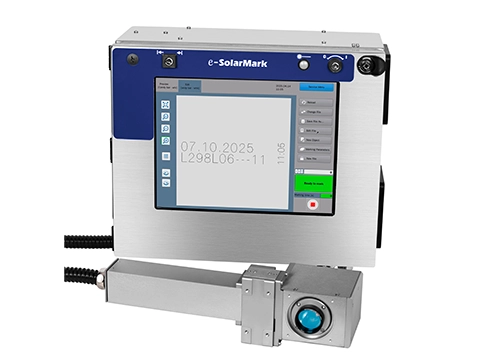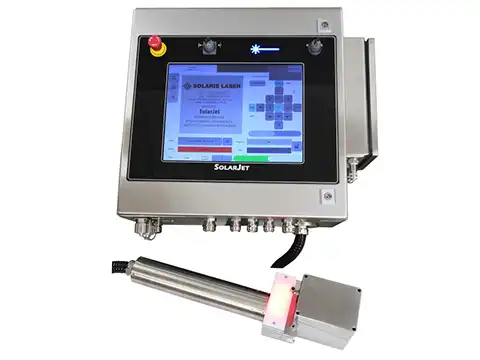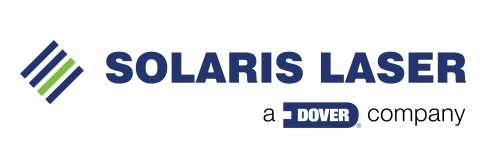Solaris Fiber Laser Marking Machine Series
Offering permanence and power across multiple industries and applications.
With more than 30 years of experience in innovation, the Solaris Laser fiber laser marking machine series guarantees high-quality permanent codes essential for compliance, traceability, and brand integrity on multiple substrates. They excel at producing all types of 2D codes, including the GS1 Digital Link, for multiple industries and market verticals.
- Produces durable marks withstanding extreme conditions
- Excels on the toughest substrates like metals
- Performs on the fastest production lines
- Ink-free marking reduces waste and lowers environmental impact
- Versatile and cost-effective laser technology

e-SolarMark+ eFLS

SolarJet FL HD
Fiber laser machines for your every requirement
Solaris Laser has spent decades refining its laser fiber marker offer to offer ultra-high precision marking for the most demanding requirements. FMCG and a huge range of industries from automobile to pharmaceuticals rely on fiber lasers for fast, accurate, and permanent marks essential for compliance, traceability, and brand integrity. Fiber laser marking machines generate a highly focused beam that can create fine, detailed markings on varied surfaces. This capability is particularly important in industries where clarity and readability of codes are crucial.
For instance, in the pharmaceutical industry, where product identification codes must be small yet highly legible, Solaris Laser fiber laser machines excel. They can produce precise alphanumeric codes, barcodes, and QR codes, including the GS1 Digital Link, ensuring that the information is easily scannable. The high contrast of the markings, especially on metals and plastics, further enhances readability, which is essential for maintaining traceability and meeting regulatory requirements.
Fiber laser markers excel in the fast-paced environments of FMCG and industrial production, where speed is a critical factor. Unlike traditional printing methods, fiber lasers do not require physical contact with the material, allowing for faster processing times. This non-contact method also reduces the wear and tear on the marking equipment, contributing to longer operational life and less downtime.
The ability of fiber laser marking machines to operate at high speeds without sacrificing quality makes them ideal for high-volume production lines such as bottles, cans, and box packaging, marking thousands of units per hour.
The durability and permanence of the markings produced by fiber laser markers are among the technology's most valued attributes. Unlike ink-based marking methods, which can fade, smear, or be removed, fiber laser markings remain indelible to wear, chemicals, and environmental factors. This permanence is particularly important in industries where products are exposed to harsh conditions, such as extreme temperatures, moisture, or chemicals. Besides their precision and speed fiber laser marking machines have emerged as a leading marking technology among manufacturers due to their versatility and cost-effectiveness.
Solaris Laser fiber laser machines:
multi-substrate marking across a range of industries
Fiber lasers are highly versatile, and capable of marking a wide range of materials with consistent quality. This versatility is a significant advantage for industries that work with diverse substrates. In the FMCG sector, where packaging materials vary widely, fiber laser markers can adapt to different surfaces without requiring significant adjustments. Fiber laser markers excel on all kinds of metals, including stainless steel, aluminum, brass, copper, titanium, and coated metals. The technology also performs optimally on blister packs and metalized labels as well as aluminium lids and cans; cables and wires and metal parts.
Solaris Laser fiber lasers are also idoneous for composite materials such as carbon fiber and glass fiber composites, used across modern high-tech industries. Their easy integration with Industry 4.0 production lines and IoT devices aids their expanding use in fast-growing, industries and in integrating with Original Equipment Manufacturers (OEMs) i. Fiber laser marking machines are also perfect for high-density plastics that can absorb the laser's wavelength, including ABS, polycarbonate, and polyamide, used for wraps, films, and pouches.
In the automotive industry, fiber laser marking machines are used on parts made of metal, plastic, and other composite materials. The ability to create durable, high-contrast marks on different surfaces makes fiber lasers an invaluable tool in ensuring that every part is properly identified and traceable throughout the supply chain. Similarly, in the electronics industry, where components are often small and made of various materials, fiber laser machines provide the precision and flexibility needed to mark these components without damaging them.
The resistance of certain fiber laser markers to harsh conditions, such as extreme temperatures, moisture, or chemicals, makes them a popular choice in industries where these are the norm like aerospace, automobile, and chemicals, among others; and unlike ink-based marking methods, which can fade, smear, or be removed, fiber laser markings remain indelible to wear, chemicals, and the harshest environmental factors.
Fiber laser machines offer significant cost advantages when it comes to Total Cost of Ownership (TCO) over traditional marking methods. One of the primary cost-saving aspects is the lack of consumables, such as inks or ribbons, reducing ongoing operational costs and eliminating waste from these materials, contributing to a more sustainable operation.
Moreover, Solaris Laser fiber laser markers are known for their low maintenance requirements. The solid-state design of fiber lasers means fewer moving parts, leading to less wear and tear over time. Additionally, fiber lasers have a longer operational lifespan compared to other laser types, which further reduces the total cost of ownership (TCO).
